Have you ever been in an interview and flubbed a question?
Been there. Done that.
I didn’t realize I was making accidental interview mistakes until I started interviewing. Then I realized there are some easy things to AVOID in an interview.
Here’s what I’ve learned and want to share with you. I will teach you 8 of the worst things you can say in an interview, including:
- 8 real things I’ve heard people say during an interview (#3 is my favorite)
- the #1 way to ace an interview with the BEST answers (and how to avoid saying the WRONG things)
Are you ready for the cringe? Let’s dive in.
#1: “I don’t have any weaknesses.”
In almost ALL interviews, you’re going to get this question: “What is your biggest weakness?”
…or at least some variation of it, like “What was your biggest struggle at your last job?”
Never say nothing!
If you say you don’t have any weaknesses, you are either:
- too blind to see them, or
- hiding something
The other horrible thing to do is answer with a “fake” weakness, like “I’m a perfectionist.” C’mon. That’s not a real weakness. Your interviewer asks this question because they want to see if you are honest and if the weakness isn’t going to be a future problem.
The Solution: Give a REAL weakness you have, but frame it in a way that it won’t affect your job performance. For example, you can say something like:
“I often get confused if I have to multitask or have many different objectives to complete, so I’ve been working on focusing on one thing at a time. So far, it seems to work!”
#2: “It’s all on my resume.”
When an interviewer asks you, “So, Vanessa, how long were you at your last job?”
Do NOT tell them to check the resume. The reason the interviewer asks you this question is because they don’t want it to FEEL like an interview. They want to keep it as casual as possible. If the interviewer starts reading off, like:
- “OK, I see from 2013 to 2015, you’ve been working at Company Z.”
- “And it looks like you’ve also worked part time at Company Y for 6½ months.”
Telling your interviewer to check your resume is a GREAT way… to break rapport.
When I am in a hiring position, I am literally scanning dozens or even hundreds of resumes. Either I don’t remember, or I want to find out if YOU remember what your resume looks like.
The Solution: Use this opportunity to recall your past experiences and build rapport. Talk in a conversational tone and use this opportunity to really connect with your interviewer and show them you really are telling the truth about your past.
#3: “What’s the bonus or raise schedule?”
Now listen, I know pay is important. And you should talk about it.
But this question is impossible for a hiring manager to answer. Why? Because giving a raise all depends on your performance, the profits of the company, etc.
Never ask this question until after you prove your performance.
The Solution: If you NEED an answer to this question, a better way is to ask:
“How will I know I’m succeeding?”
With that question, you’ll learn how success is noted and celebrated at this company.
#4: “I hated my last boss!”
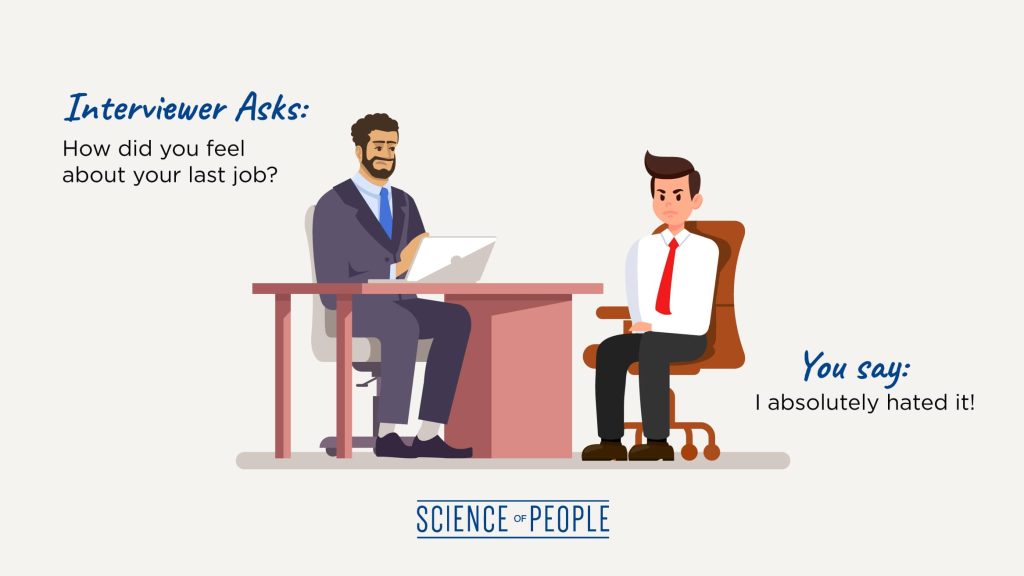
Chances are, your interviewer might ask a question or two about your previous employment history. And you may have an entire list of things you hated about your last job:
- Your boss was a jerk.
- Your coworkers were fake or toxic.
- You were constantly facing burnout.
- Heck, maybe even the way the secretary smiled at you secretly drove you mad.
Avoid negativity at all costs!
There’s a phenomena known as spontaneous trait transference: when you start talking negatively, the other person’s brain actually assigns those traits to YOU. So if you say words like “HATE,” “BAD,” or “TERRIBLE,” they’ll start thinking it about you!
Whatever your previous situation, now is NOT the time to speak daggers and knives about your previous job. After all, if you manage to get this job and end up quitting, the last thing your interviewer wants is you speaking bad about THEM. Plus, being angry shows a negative side of yourself that will make a bad first impression.
The Solution: Focus on framing. Instead of saying how bad your boss was, try framing your response to position yourself in a good light. For example, were you not able to showcase your strengths? Maybe you stopped learning and wanted to move on for better growth?
You can even say something as simple as, “It just wasn’t a great fit.” They’ll know something didn’t quite match up but realize you’re also being polite.
Either way, make sure you frame your answer positively and try to remain future oriented, instead of resenting the past. Remember: it’s a job interview, not a confession.
#5: “I don’t have any questions to ask you.”
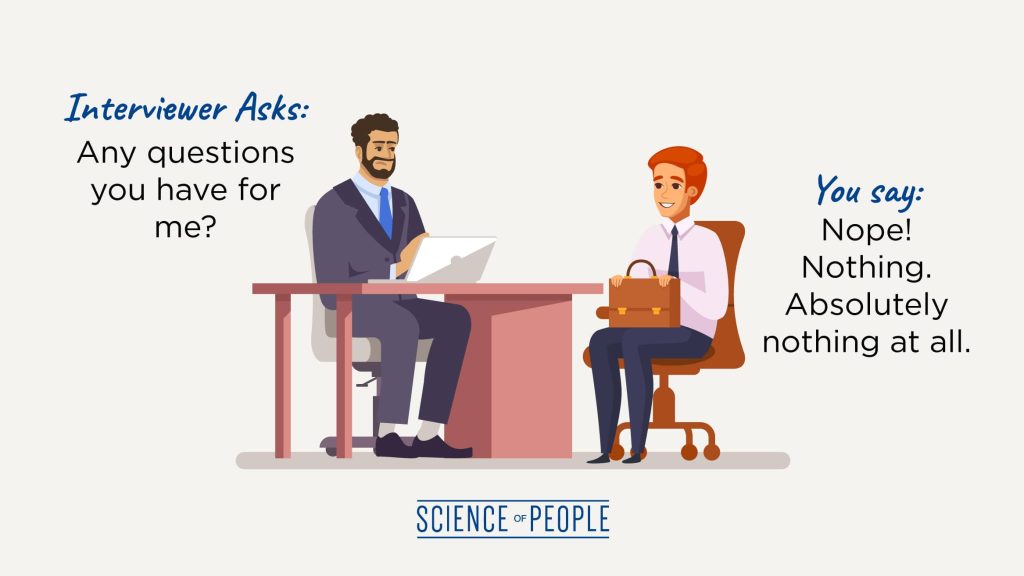
One of the questions I always ask my job applicants is: “Do you have any other questions for me?” I love this question because if they have any confusion at all, now’s their chance to clear things up.
The Solution: Always have a question or two ready. Asking final questions shows your interviewer you’re interested in the company and that you understand the full scope of the job’s duties. And AVOID asking questions that you can easily find answers to, such as information readily available on their website. The best questions to ask are ones that are not publicly known.
For example, one of my recent applicants asked me the question, “What is your personal passion project?” Since I LOVE this question (and use it regularly in networking events), it showed me she did her research about me AND it was a great way to leave the room on a high note.
#6: “I don’t know.”
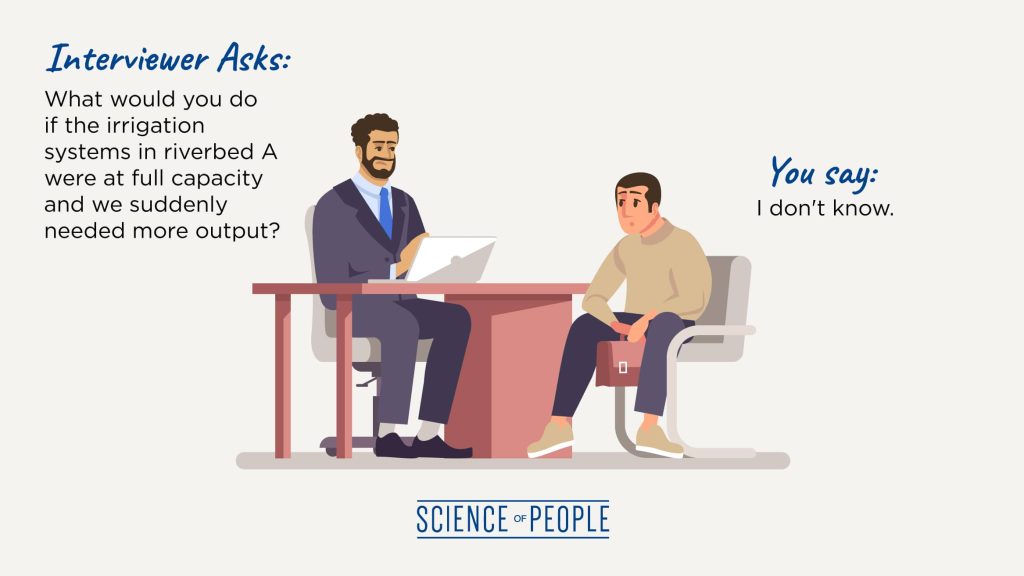
Have you ever been asked a really tough question you really didn’t know the answer to? Your thought process might have been something like this:
- “What do I say?”
- “Should I lie?”
- “What does that even mean!?”
Basically, your brain goes haywire thinking of all the possible responses.
…and what you ACTUALLY end up settling on is:
“I don’t know.”
This response is deadly because it’s an instant conversation killer. After “I don’t know,” you’re basically telling your interviewer they’re going to have to hold your hand ALL THE TIME if you somehow get the job.
(P.S. I’ve only heard this answer twice… and needless to say, they didn’t get an offer.)
The Solution: Add a condition. If you really don’t know, the best method is to just tell them…
Whatever you do, do NOT lie. Lies can easily be spotted and put you in an even worse position than before.
What you can do is say you don’t know but add a condition at the end. For example, you can say:
- “I don’t know, but I’d find out by looking it up online/asking the manager/etc.”
- “I don’t know, but I’d try to do it like this…”
- “I don’t know, but I’ve faced a similar situation when XYZ.”
By adding a condition, you are showing your potential employer you are honest and willing to learn or think strategically. Employers don’t necessarily want the smartest person of the bunch; most want someone who is eager to learn and take on new challenges without simply giving up.
And you never know… it might even be a trapdoor to see what you’d say when faced with an impossible-to-solve question.
#7: “You can get rid of me anytime!”
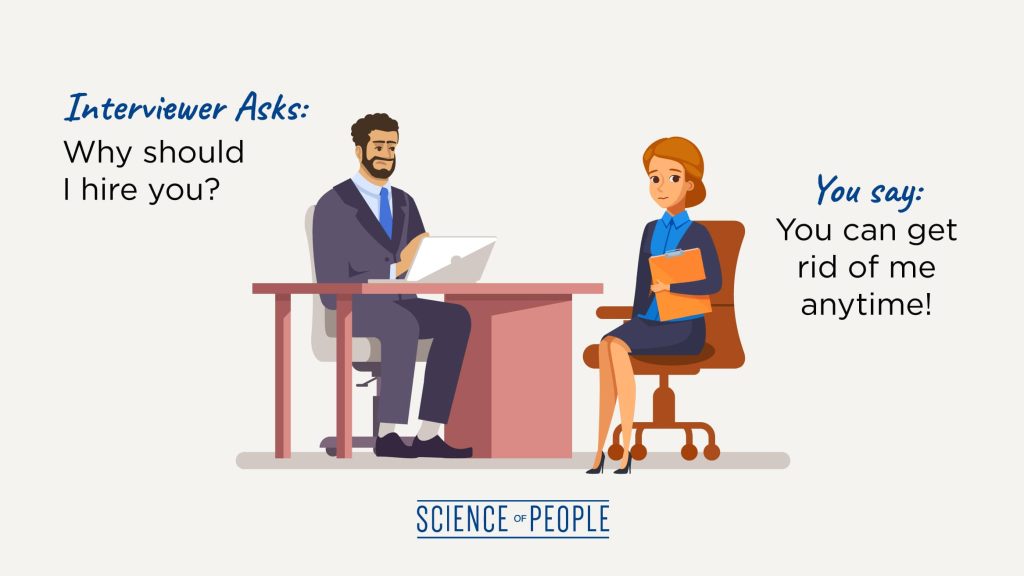
Here’s one of the funniest things you should not say in an interview. Believe it or not, I actually heard this from a potential candidate once as we finished our interview. Right after we exchanged thanks, he turned to me and said, “Oh, by the way, I know I’m not the best, but you can totally get rid of me anytime if you want!”
Ouch. Way to shoot yourself in the foot!
The Solution: Be competent. Even if you’re just acting, act like you belong! Nobody wants to hire a “black sheep” for the company. If you’re having a hard time, try to practice some good ol’ self-love or remind yourself why you’re a good fit for the company in the first place.
#8: “I don’t have my resume.”
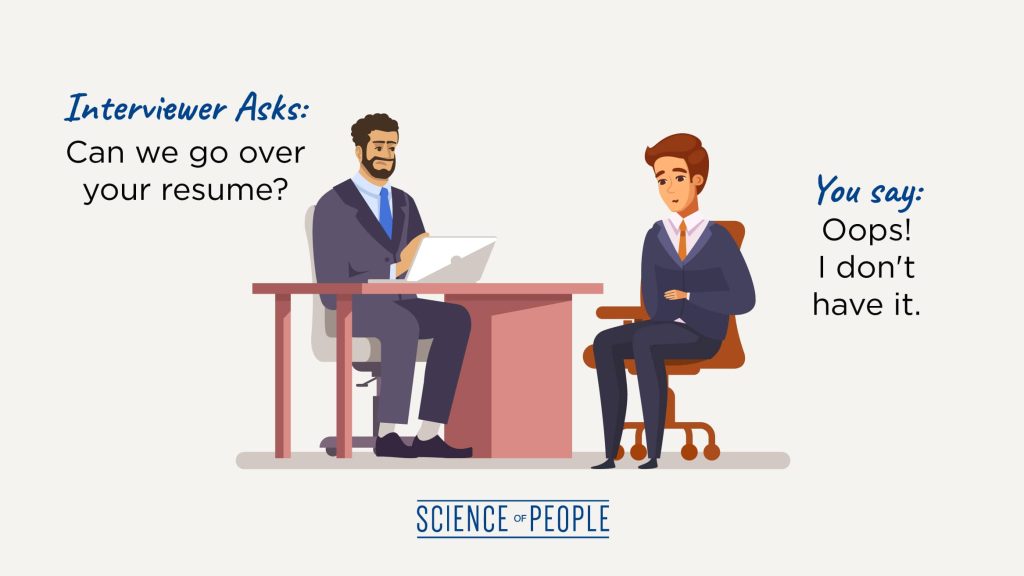
Imagine this: you sit down for an interview, your potential employer looks you straight in the eyes, and he asks for your resume. Except you didn’t bring it.
*Big gulp*
The Solution: Be prepared. Even if you emailed your resume to them beforehand, always be prepared and assume it’s your job to have it ready.
Bring 2 copies of your resume. One for your interviewer, and one for you.
I remember one of my earliest interviews: I only prepared one copy and had to play back-and-forth with the interviewer.
Boy, was that embarrassing! If you’re going to have more than one interviewer, make sure there are enough copies of your resume for every person in the room to have one.
#9 (Bonus): “What’s your name again?”
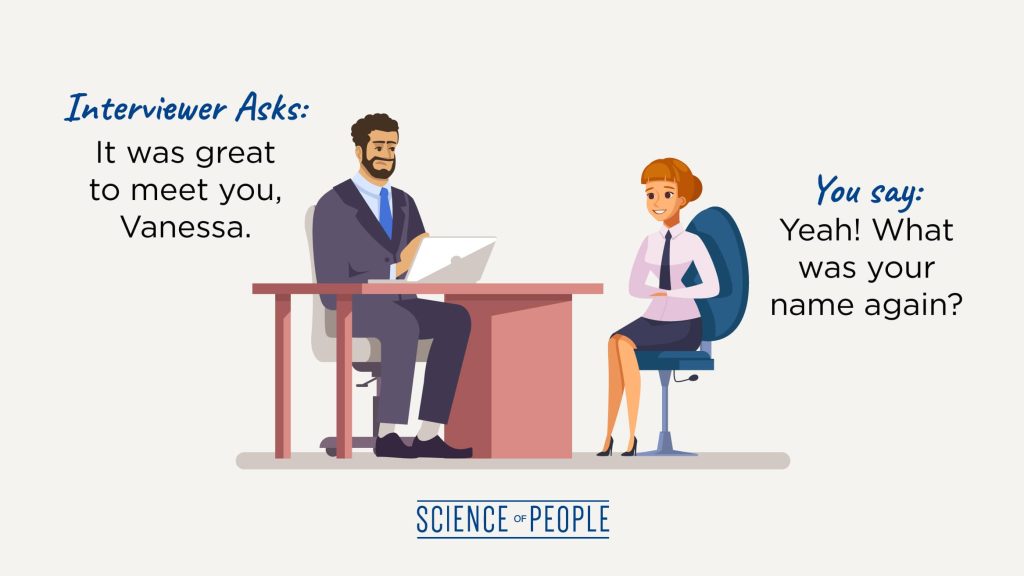
Here’s a bonus thing to never say in an interview! The last thing you want to do is forget your interviewer’s name.
I’ve learned early on that saying the interviewer’s name makes a huge impact. It’s even more impressive if they have a hard-to-pronounce name like Dara Khosrowshahi (the CEO of Uber).
The Solution: The best way to start off any good interview is to repeat the interviewer’s name. If you can, make sure to get your interviewer’s name beforehand and memorize it fully.
Or if you’re meeting your interviewer for the first time, practice repeating his/her name back: “It’s a pleasure to meet you, XYZ!”
If you struggle to remember people’s names, you’re not alone! Forgetting names is a common problem when meeting new people. Fortunately, there’s an easy fix. Check out my video below or read my guide to banish name forgetfulness forever and remember anyone’s name almost instantly:
How to Ace Your Interviews (And Never Flub Again!)
OK, I know you’ve been waiting for this part. Want to know the #1 way to make sure your interviews are smooth sailing?
The #1 way to interview success is…
Be prepared!
It sounds simple, but it is SO true. Prepare yourself, then overprepare. You can NEVER be too overprepared:
- Go to the company’s website and start reading. Read their “About Us” page. Read their blog posts. Read their latest news, company values, and everything else you can devour.
- Prepare your answers. Know how to answer questions like “Tell me about yourself” so you know exactly what to say, and you won’t ever flub a question again.
- Work on your delivery. It’s more than just reading from your mental scripts—you’ve got to deliver your answers convincingly and with confidence. Need a boost? Why not check out my best-selling book, Captivate: The Science of Succeeding with People. In my book, I dive into the best ways to win over people’s hearts and become the best communicator you can be. And best of all, the first chapter is free!
I hope you learned what not to say in an interview! Have you ever said something totally embarrassing in an interview? Let me know down in the comments below!
And consider checking out more interview articles to further prepare yourself.


